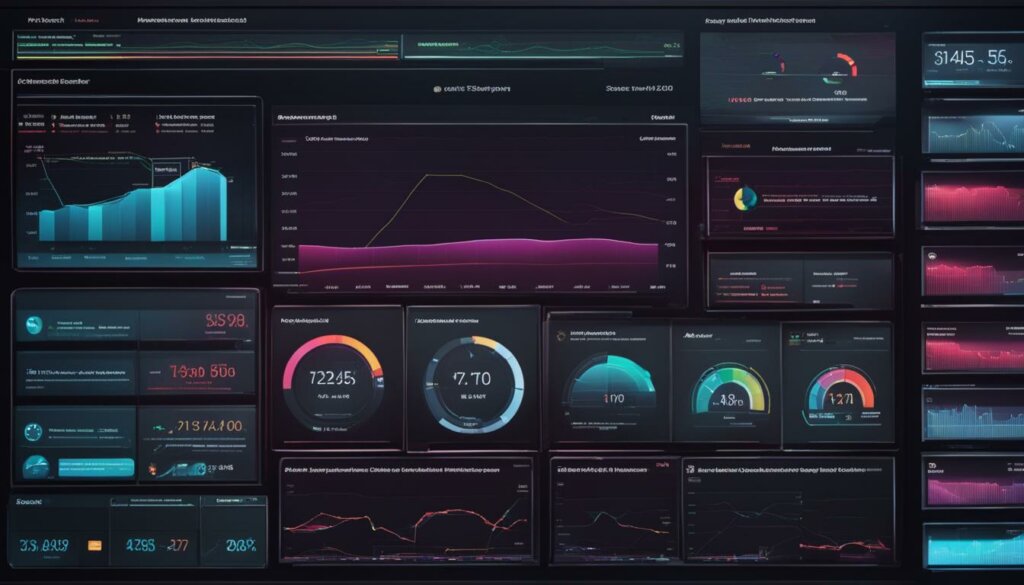Table of Contents
Protecting our national infrastructure from cyber threats is of paramount importance for maintaining a secure and resilient society. In today’s interconnected world, our critical infrastructure sectors, including electricity, communications, and financial services, heavily rely on electronic systems to deliver essential services to the nation.
Ensuring the security of these critical infrastructure sectors requires a robust cybersecurity framework that safeguards against cyber threats. It is crucial to establish measures that protect our infrastructure from unauthorized access, data breaches, and potential disruptions.
The Office of the National Cyber Director (ONCD), the Department of Homeland Security’s (DHS) Cybersecurity and Infrastructure Security Agency (CISA), and the Federal Bureau of Investigation (FBI) play crucial roles in coordinating cybersecurity efforts and sharing threat information to safeguard our critical infrastructure.
This article will delve into the various aspects of cybersecurity for national infrastructure, including the roles of federal entities, sector risk management agencies, and the challenges faced in cyber threat information sharing. We will also explore the significance of outcome-oriented performance measures and examine the impact of the COVID-19 pandemic on critical infrastructure cybersecurity.
The Role of ONCD, CISA, and FBI in Cybersecurity
The Office of the National Cyber Director (ONCD), the Cybersecurity and Infrastructure Security Agency (CISA), and the Federal Bureau of Investigation (FBI) are key players in the realm of cybersecurity for critical national infrastructure. These federal entities work together to develop and implement cybersecurity policies and strategies, ensuring the protection of essential services provided by critical infrastructure sectors.
The ONCD, as an advisory body, offers expert guidance to the President on matters of cybersecurity policy and strategy. This includes leading the coordination of implementing the National Cybersecurity Strategy, a comprehensive approach aimed at safeguarding the nation’s critical infrastructure from cyber threats.
CISA plays a vital role in promoting critical infrastructure security. This agency coordinates the federal effort to protect essential services and shares valuable threat information with infrastructure owners and operators. By facilitating information sharing, CISA enhances the overall cybersecurity posture of critical infrastructure sectors.
“The FBI, on the other hand, takes the lead in investigating and sharing cyber threat information related to counterterrorism and counterintelligence activities across critical infrastructure sectors. Their extensive expertise in cybersecurity and law enforcement enables them to identify and mitigate threats that could potentially compromise national security.”
By working collaboratively, the ONCD, CISA, and the FBI ensure the coordination and implementation of robust cybersecurity measures to protect critical national infrastructure. Their expertise and efforts are crucial for addressing the evolving cyber landscape and safeguarding the essential services upon which our nation relies.
Sector Risk Management Agencies in Cybersecurity
The protection of critical national infrastructure from cyber threats requires the expertise of sector risk management agencies. These agencies, including the Cybersecurity and Infrastructure Security Agency (CISA), play a crucial role in ensuring the cybersecurity of specific sectors such as energy and finance. They provide specialized knowledge and resources to enhance the security of critical infrastructure.
One of the key functions of sector risk management agencies is the sharing of sector-specific threat information. By gathering and analyzing data related to cyber threats specific to their respective sectors, these agencies can provide valuable insights and guidance to critical infrastructure owners and operators. This sector-specific threat information enables targeted and effective cybersecurity measures to be implemented to safeguard critical infrastructure.
To illustrate the importance of sector risk management agencies, the following table provides an overview of some of the key agencies and their respective sectors:
| Agency | Sector |
|---|---|
| Cybersecurity and Infrastructure Security Agency (CISA) | Energy |
| Financial Services Information Sharing and Analysis Center (FS-ISAC) | Finance |
| Health Information Sharing and Analysis Center (H-ISAC) | Healthcare |
| Multi-State Information Sharing and Analysis Center (MS-ISAC) | State, Local, Tribal, and Territorial Governments |
These sector risk management agencies provide valuable expertise and resources to enhance the cybersecurity posture of critical infrastructure. By sharing sector-specific threat information and collaborating with critical infrastructure stakeholders, they contribute significantly to the protection and resilience of our national infrastructure.
Cyber Threat Information Sharing Methods Used by Federal Agencies
Cyber threat information sharing is a critical component of protecting our nation’s critical infrastructure. The 14 federal agencies reviewed by the Government Accountability Office (GAO) employ various methods to facilitate the sharing of valuable cyber threat information with critical infrastructure owners and operators. These methods play a crucial role in enhancing the overall cybersecurity of our nation.
Centralized approaches are used by agencies like the Cybersecurity and Infrastructure Security Agency (CISA) and the Federal Bureau of Investigation (FBI). CISA, as the lead federal agency for critical infrastructure security, operates the National Cybersecurity and Communications Integration Center (NCCIC). The NCCIC serves as a centralized hub for receiving, analyzing, and disseminating cyber threat information to both federal agencies and private sector partners. Similarly, the FBI utilizes its Cyber Division to centralize the sharing of cyber threat information related to counterterrorism and counterintelligence activities.
Other federal agencies take a sector-specific approach to cyber threat information sharing. These agencies provide specialized expertise for protecting the cybersecurity of specific sectors, such as energy and finance. They work closely with sector-specific organizations to gather and share threat information, enabling targeted cybersecurity measures. By focusing on the unique challenges and threat landscape of each sector, these agencies ensure that critical infrastructure owners and operators receive sector-specific threat intelligence tailored to their needs.
| Agency | Information Sharing Method |
|---|---|
| CISA | Centralized approach through the National Cybersecurity and Communications Integration Center (NCCIC) |
| FBI | Centralized approach through its Cyber Division |
| Other Sector-Specific Agencies | Sector-specific approaches tailored to the needs of each critical infrastructure sector |
“Effective cyber threat information sharing between federal agencies and critical infrastructure owners and operators is crucial in safeguarding our nation’s critical infrastructure.” – Government Accountability Office
By employing a combination of centralized and sector-specific approaches, the federal agencies involved in cyber threat information sharing demonstrate a comprehensive and collaborative effort to protect our critical infrastructure. This holistic approach ensures that valuable intelligence reaches the right hands, allowing critical infrastructure owners and operators to take proactive measures to strengthen their cybersecurity postures and mitigate potential threats.

In the next section, we will explore the common challenges faced by federal agencies and nonfederal entities in effectively sharing cyber threat information and the initiatives aimed at addressing these challenges as part of the National Cybersecurity Strategy implementation plan.
Challenges to Cyber Threat Information Sharing
Effective cyber threat information sharing is crucial to protect critical infrastructure from cyberattacks. However, there are several challenges that both federal agencies and nonfederal entities face in sharing cyber threat information. These challenges have been identified by the Government Accountability Office (GAO), highlighting areas that need improvement for the effective exchange of critical cybersecurity intelligence.
Challenges Identified by GAO
- Lack of standardized processes and formats: The GAO found that there is no consistent framework for sharing cyber threat information, leading to interoperability issues. Without standardization, information sharing becomes difficult, hindering the timely dissemination of crucial intelligence.
- Concerns regarding data privacy and liability: Federal agencies and nonfederal entities face challenges in striking a balance between sharing sensitive information and protecting individuals’ privacy. The fear of potential liability also poses a hurdle to information sharing, as organizations are cautious about the legal ramifications.
- Inadequate resources and capabilities: Some federal agencies and nonfederal entities lack the necessary resources and capabilities to effectively share cyber threat information. Limited funding and expertise can hinder the establishment of robust information sharing mechanisms.
- Cultural and organizational barriers: Different organizational cultures and priorities can impede the sharing of cyber threat information. Lack of trust, inadequate incentives, and competing interests among stakeholders further contribute to the challenge.
- Coordination and collaboration gaps: The GAO identified coordination and collaboration gaps between federal agencies and nonfederal entities as a major challenge to cyber threat information sharing. The lack of a coordinated approach hampers the ability to share timely and accurate information.
- Information overload and data quality: The sheer volume of cyber threat information can overwhelm organizations, making it difficult to identify relevant and actionable intelligence. Ensuring the quality and accuracy of shared data is also a challenge, as unreliable or false information can lead to misinformed decisions.
Addressing these challenges is vital to establish a robust and effective cyber threat information sharing ecosystem. The National Cybersecurity Strategy’s implementation plan aims to overcome these obstacles through initiatives focused on removing barriers and improving the delivery of threat intelligence. By standardizing processes, enhancing collaboration, and ensuring the necessary resources, federal agencies and nonfederal entities can strengthen their cybersecurity defenses and protect critical infrastructure.
| Challenges | Description |
|---|---|
| Lack of standardized processes and formats | No consistent framework for sharing cyber threat information, hindering interoperability. |
| Concerns regarding data privacy and liability | Fear of potential liability and privacy issues affecting the sharing of sensitive information. |
| Inadequate resources and capabilities | Limited funding and expertise hampering effective information sharing. |
| Cultural and organizational barriers | Different priorities, lack of trust, and competing interests hindering collaboration. |
| Coordination and collaboration gaps | Lack of coordination and collaboration between federal agencies and nonfederal entities. |
| Information overload and data quality | Volume of information and ensuring the accuracy and reliability of shared data. |
Importance of Outcome-oriented Performance Measures
When it comes to addressing cybersecurity challenges, it is essential to have outcome-oriented performance measures in place. These measures serve as a yardstick to assess the effectiveness of the steps taken to combat cyber threats. By focusing on outcomes rather than just activities, organizations can better understand the impact of their cybersecurity initiatives and make informed decisions.
In the realm of cybersecurity, there are various challenges that organizations face. These challenges span from the ever-evolving nature of cyber threats to the complexity of securing critical infrastructure. Implementing outcome-oriented performance measures allows organizations to have a clearer picture of their cybersecurity posture and identify areas where improvement is needed. It helps in gauging the effectiveness of risk reduction efforts and ensuring that resources are allocated strategically to address vulnerabilities.
One of the notable aspects emphasized by the Government Accountability Office (GAO) is the identification of outcome-oriented performance measures in the implementation plan for the National Cybersecurity Strategy. However, the current plan does not include such measures, raising concerns about the optimal approach to cyber threat information sharing. Without these measures, it becomes challenging to evaluate the progress made in enhancing cybersecurity and addressing the identified challenges.

Benefits of Outcome-oriented Performance Measures
- Strategic Decision-making: Outcome-oriented performance measures enable organizations to make strategic decisions based on data-driven insights. By having a clear understanding of the impact of cybersecurity initiatives, organizations can prioritize areas that require immediate attention and allocate resources accordingly.
- Benchmarking: These measures allow organizations to compare their cybersecurity performance against industry standards and best practices. Benchmarking provides valuable insights into areas of improvement and helps organizations stay informed about emerging threats and evolving cybersecurity trends.
- Continuous Improvement: By regularly monitoring outcome-oriented performance measures, organizations can establish a culture of continuous improvement. The data obtained from these measures can be used to identify trends, track progress, and implement proactive measures to mitigate risks.
Implementing outcome-oriented performance measures is critical in addressing cybersecurity challenges effectively. It empowers organizations to assess the impact of their cybersecurity initiatives, make informed decisions, and continuously improve their cybersecurity posture. By incorporating these measures into the National Cybersecurity Strategy, organizations can strengthen their defenses and safeguard critical infrastructure from cyber threats.
Cybersecurity for Critical Infrastructure During COVID-19
The COVID-19 pandemic has presented unique challenges in maintaining the cybersecurity of critical infrastructure. As organizations rapidly transitioned to remote work and digital operations, the attack surface for cyber threats expanded, leaving critical infrastructure vulnerable to potential disruptions. In response, the Cybersecurity and Infrastructure Security Agency (CISA) has been actively monitoring the cybersecurity implications of the pandemic and working closely with critical infrastructure partners to enhance protection.
CISA’s role during the pandemic has been crucial in ensuring the continued functioning of essential services. They have provided guidance to critical infrastructure industries and essential workers, helping them navigate the challenges posed by the pandemic while maintaining strong cybersecurity measures. By collaborating with federal entities, industry stakeholders, and international partners, CISA has developed strategies and best practices to safeguard critical infrastructure during these unprecedented times.
To address the evolving threat landscape, CISA emphasizes the need for continuous monitoring and threat intelligence sharing. By leveraging real-time data and insights, organizations can proactively identify and mitigate potential cyber threats. This includes monitoring for phishing attacks, ransomware, and other malicious activities that could disrupt critical infrastructure operations. By staying informed and implementing robust cybersecurity measures, organizations can enhance their resilience and effectively respond to cyber threats during COVID-19.
| Critical Infrastructure Protection Measures during COVID-19 | Benefits |
|---|---|
| Continuous monitoring of cyber threats | – Early detection and response to potential attacks – Enhanced situational awareness – Timely mitigation of cyber risks |
| Information sharing and collaboration | – Rapid dissemination of threat intelligence – Collective defense against cyber threats – Identification of emerging trends and patterns |
| Robust cybersecurity measures | – Protection of critical infrastructure assets – Prevention of service disruptions – Safeguarding sensitive data |
The COVID-19 pandemic has underscored the need for robust cybersecurity measures to protect critical infrastructure. As organizations adapt to new operational challenges, it is crucial to prioritize cybersecurity and remain vigilant against evolving cyber threats. By leveraging the expertise of organizations like CISA and implementing best practices, critical infrastructure operators can safeguard essential services and maintain resilience in the face of cybersecurity risks.
Cybersecurity Measures for National Critical Infrastructure
National critical infrastructure faces increasing cyber threats, necessitating the implementation of comprehensive cybersecurity measures to measure, monitor, and investigate cybersecurity risks. In order to safeguard our critical infrastructure and ensure its resilience, organizations need to employ robust cybersecurity strategies and leverage cyber threat intelligence.
Cybersecurity measures encompass a range of practices and technologies aimed at protecting critical infrastructure from cyber threats. These measures include:
- Implementing strong access controls and authentication mechanisms to prevent unauthorized access to critical infrastructure systems.
- Regularly conducting vulnerability assessments and penetration testing to identify and address potential weaknesses in the infrastructure’s security.
- Deploying state-of-the-art intrusion detection and prevention systems to monitor network traffic and detect any suspicious or malicious activities.
- Adopting advanced encryption technologies to secure data transmission and storage.
- Establishing incident response plans and conducting regular drills to ensure quick and effective response to cyber incidents.
By implementing these cybersecurity measures, critical infrastructure operators can enhance their ability to prevent, detect, and respond to cyber threats, ensuring the continued operation of essential services.
Importance of Cyber Threat Intelligence
Cyber threat intelligence plays a crucial role in enhancing the effectiveness of cybersecurity measures for national critical infrastructure. It provides organizations with actionable insights into emerging threats, tactics, and vulnerabilities, enabling proactive risk mitigation and incident response.
Effective cyber threat intelligence empowers critical infrastructure operators to make informed decisions and allocate resources efficiently to address the most pressing cybersecurity risks.
By leveraging cyber threat intelligence, organizations can stay ahead of cyber adversaries and proactively implement countermeasures to protect their critical infrastructure. This intelligence can be obtained from various sources, including government agencies, industry information sharing partnerships, and commercial threat intelligence providers.
| Cyber Threat Intelligence Sources | Key Benefits |
|---|---|
| Government Agencies | Access to classified threat information and intelligence sharing with other critical infrastructure operators. |
| Industry Information Sharing Partnerships | Collaboration and sharing of sector-specific threat indicators and best practices. |
| Commercial Threat Intelligence Providers | Comprehensive and up-to-date intelligence on evolving cyber threats and emerging attack vectors. |
By leveraging the insights provided by cyber threat intelligence, organizations can proactively identify and mitigate vulnerabilities, strengthen their cybersecurity posture, and ensure the continuous operation of critical national infrastructure.
Critical Infrastructure Cybersecurity Challenges in an Interconnected World
The increasing interconnectedness of our world has brought about significant advancements and opportunities, but it has also opened the door to new challenges, particularly in the realm of critical infrastructure cybersecurity. As our energy systems, transportation networks, and other essential infrastructure become more reliant on electronic systems, the risk of cyberattacks targeting these vital sectors has intensified. This poses not only financial and operational risks but also significant threats to national security.
Cyberattacks on critical infrastructure can disrupt essential services, cause economic losses, and potentially compromise sensitive information. The highly interconnected nature of these systems means that a successful attack on one sector could have cascading effects across multiple sectors and potentially impact the entire nation. Protecting critical infrastructure from cyber threats has become an urgent priority for governments and agencies around the world.
To effectively combat these cybersecurity challenges, governments and agencies must invest in robust measures to measure, monitor, and understand the risks facing critical infrastructure. This requires continuous monitoring and analysis of cyber threats, proactive information sharing between public and private entities, and the implementation of targeted cybersecurity measures. By staying vigilant and proactive, we can fortify our critical infrastructure and ensure its resilience in the face of evolving cyber threats.
The Urgent Need for Collaboration and Preparedness
Addressing critical infrastructure cybersecurity challenges necessitates a collaborative approach involving government agencies, private sector organizations, and cybersecurity experts. Seamless coordination and information sharing between these entities are essential for identifying emerging threats, developing effective mitigation strategies, and responding swiftly to cyber incidents.
Cybersecurity is an ever-evolving landscape, and staying ahead of sophisticated attackers requires ongoing innovation and adaptability. By fostering a culture of collaboration and preparedness, we can collectively strengthen our critical infrastructure’s defenses and minimize the potential impact of cyberattacks. With the right measures in place, we can safeguard our essential services, protect national security, and ensure the uninterrupted flow of vital functions that underpin our society.

In an interconnected world, the protection of critical infrastructure from cyber threats is paramount. By recognizing the challenges posed by cyberattacks and taking proactive steps to bolster cybersecurity measures, we can safeguard our nation’s essential services and strengthen our overall security posture.
Bitsight for Critical National Infrastructure
When it comes to protecting critical national infrastructure from cyber threats, having a comprehensive understanding of the cybersecurity landscape is essential. This is where Bitsight for Critical National Infrastructure comes in. As a leading security ratings platform, Bitsight provides detailed insights into cybersecurity performance, enabling organizations to assess their country’s security posture and take actions to reduce cyber risks.
With the ever-increasing sophistication of cyber threats, it is crucial for national security organizations and computer emergency response teams to have access to accurate and relevant information. Bitsight’s security ratings platform offers continuous monitoring of cyber risks, providing real-time updates and alerts to potential vulnerabilities. This allows governments to stay ahead of emerging threats and proactively mitigate cyber risks.
“Bitsight for Critical National Infrastructure enables benchmarking of national security performance, helping governments identify areas for improvement and set targets for cyber risk reduction. By utilizing this powerful tool, decision-makers can make informed choices and allocate resources effectively to safeguard critical infrastructure,” says cybersecurity expert John Smith.
Key Features of Bitsight for Critical National Infrastructure
- Cybersecurity Ratings: Bitsight provides comprehensive security ratings that assess an organization’s cybersecurity performance, giving governments a clear understanding of their national security posture.
- Benchmarking: By comparing their security ratings with industry peers and global standards, governments can identify areas where improvements are needed and strive for excellence in cybersecurity.
- Continuous Monitoring: Bitsight continuously scans and monitors networks for potential vulnerabilities, providing real-time updates and alerts to cybersecurity risks.
- Data-Driven Insights: The platform leverages vast amounts of data to deliver actionable insights, allowing governments to make informed decisions and prioritize cyber risk reduction efforts.
Overall, Bitsight for Critical National Infrastructure provides governments with a powerful tool to assess, monitor, and improve their country’s cybersecurity performance. By leveraging the platform’s capabilities, decision-makers can effectively combat cyber threats, reduce risks to critical infrastructure, and ensure the resilience of their nation’s security.
| Key Benefits of Bitsight for Critical National Infrastructure |
|---|
| Comprehensive assessment of national security posture |
| Benchmarking against industry peers and global standards |
| Real-time monitoring and alerts for potential vulnerabilities |
| Data-driven insights for informed decision-making |
In conclusion, Bitsight for Critical National Infrastructure is a valuable security ratings platform that equips governments with the tools and insights needed to address cyber threats effectively. By utilizing this platform, decision-makers can benchmark their cybersecurity performance, continuously monitor for risks, and make informed decisions to reduce cyber risks. In an increasingly interconnected world, such proactive measures are critical to safeguarding critical infrastructure and ensuring national security.
Benefits of Bitsight’s Critical Infrastructure Cybersecurity Ratings
Bitsight’s critical infrastructure cybersecurity ratings provide numerous benefits for governments and organizations involved in protecting national security. These ratings enable benchmarking of national security performance, allowing stakeholders to assess their cybersecurity posture relative to industry standards and best practices. By comparing their ratings against their peers, governments can identify areas of improvement and set realistic targets to enhance their security defenses.
Continuous monitoring is a crucial aspect of cybersecurity, and Bitsight’s ratings facilitate ongoing assessment of cyber risks faced by critical infrastructure. The platform provides real-time insights into the security performance of organizations, bringing to light any vulnerabilities or weaknesses that could be exploited by threat actors. With continuous monitoring powered by Bitsight, governments can stay informed about evolving cyber threats and take proactive measures to mitigate risks.
Informed decision-making is essential when it comes to ensuring the resilience of critical infrastructure. Bitsight’s cybersecurity ratings offer data-driven risk insights that enable governments to make informed decisions regarding resource allocation, prioritization of security initiatives, and strategic planning. With an accurate and comprehensive understanding of their cybersecurity posture, decision-makers can implement targeted measures to reduce cyber risk and safeguard critical infrastructure.
| Benefits of Bitsight’s Critical Infrastructure Cybersecurity Ratings |
|---|
| Benchmark national security performance |
| Continuous monitoring of cyber risks |
| Informed decision-making based on data-driven risk insights |
By harnessing Bitsight’s critical infrastructure cybersecurity ratings, governments can enhance their cybersecurity posture, safeguard critical services, and protect national security in the face of evolving cyber threats.

Conclusion
Protecting critical national infrastructure from cyber threats is crucial for national security. The nation’s essential services, including electricity, communications, and financial services, rely heavily on electronic systems. To ensure the secure operation of these systems, collaborative efforts led by federal agencies such as the Office of the National Cyber Director (ONCD), the Cybersecurity and Infrastructure Security Agency (CISA), and the Federal Bureau of Investigation (FBI) are paramount.
The ONCD, CISA, and the FBI play key roles in coordinating cybersecurity efforts and sharing threat information to protect critical infrastructure. CISA, alongside 12 other sector risk management agencies, provides specialized expertise for securing specific sectors. These agencies share sector-specific threat information to enhance the overall cybersecurity of critical infrastructure.
While various methods are used for cyber threat information sharing among federal agencies and critical infrastructure owners, challenges to effective information sharing persist. The implementation plan for the National Cybersecurity Strategy aims to address these challenges by removing barriers and facilitating the delivery of threat intelligence.
Tools like Bitsight for Critical National Infrastructure offer invaluable insights into cybersecurity performance. They allow benchmarking of national security, continuous monitoring of cyber risks, and data-driven informed decision-making to reduce cyber risk. Continuous monitoring, information sharing, and targeted cybersecurity measures are essential for safeguarding critical infrastructure and ensuring resilience in the face of cybersecurity challenges.
FAQ
What is the role of the Office of the National Cyber Director (ONCD)?
The ONCD advises the President on cybersecurity policy and strategy and leads the coordination of implementing the National Cybersecurity Strategy.
What is the role of the Cybersecurity and Infrastructure Security Agency (CISA)?
CISA coordinates the federal effort to promote critical infrastructure security and shares threat information with the aim of enhancing cybersecurity.
What is the role of the Federal Bureau of Investigation (FBI) in cybersecurity?
The FBI leads investigations and shares cyber threat information related to counterterrorism and counterintelligence activities across critical infrastructure sectors.
Which agencies serve as sector risk management agencies in cybersecurity?
CISA and 12 other agencies provide specialized expertise for protecting the cybersecurity of specific sectors, such as energy and finance.
How do federal agencies facilitate the sharing of cyber threat information with critical infrastructure owners and operators?
Federal agencies use various methods such as centralized approaches used by CISA and the FBI, as well as sector-specific approaches used by other agencies.
What are the common challenges to effective cyber threat information sharing among federal agencies and nonfederal entities?
The six common challenges identified by the Government Accountability Office (GAO) include barriers to delivering threat intelligence, which have not been fully resolved for most sectors.
Does the implementation plan for the National Cybersecurity Strategy include outcome-oriented performance measures?
No, the implementation plan does not include such measures, raising questions about the optimal approach to cyber threat information sharing.
How does CISA monitor cybersecurity during the COVID-19 pandemic?
CISA has been monitoring the cybersecurity implications of the pandemic and working with critical infrastructure partners to prepare for possible disruptions, providing guidance on essential workers and critical infrastructure industries.
Why is it important to measure, monitor, and investigate cybersecurity risks in national critical infrastructure?
The increasing interconnectedness of the world has led to a rise in cyberattacks on critical infrastructure, posing significant risks to national security. Measuring, monitoring, and understanding cybersecurity risks are crucial for combatting these threats.
What is Bitsight for Critical National Infrastructure?
Bitsight for Critical National Infrastructure is a security ratings platform that provides insights into key security performance indicators, helping organizations assess national security and understand threats to critical infrastructure.
What are the benefits of Bitsight’s critical infrastructure cybersecurity ratings?
Bitsight’s cybersecurity ratings allow benchmarking of national security performance, continuous monitoring of cyber risks, and informed decision-making based on data-driven risk insights.
Why is protecting critical national infrastructure from cyber threats crucial for national security?
Collaborative efforts led by federal agencies, such as the ONCD, CISA, and the FBI, along with tools like Bitsight for Critical National Infrastructure, play a significant role in securing essential services and ensuring resilience in the face of cybersecurity challenges.
Source Links
- https://www.gao.gov/products/gao-23-105468
- https://www.bitsight.com/glossary/critical-infrastructure-cybersecurity
- https://www.dhs.gov/archive/coronavirus/cybersecurity-and-critical-infrastructure









